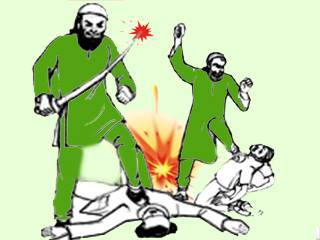Dispute of Kashi and Mathura temples
If this Act was legislated during the rule of Congress, it should be withdrawn now. Why should priests approach the court for this purpose ?

New Delhi – A Hindu body, Vishwa Bhadra Pujari Purohit Mahasangh’ has moved the Supreme Court challenging a provision of a 1991 law that provides for maintaining “religious character” of holy structures as it existed on 15th August 1947, in a bid to open the litigation route to reclaim disputed religious sites other than the Ram Janmabhoomi in Ayodhya. Adv. Vishnu Shankar Jain has filed the petition on behalf of the petitioner.
The petition, which has challenged Section 4 of the Places of Worship (Special Provisions) Act, 1991, assumes significance in the case of Kashi and Mathura where two disputed mosques stand. The law also prohibits the conversion of any temple into a mosque and vice versa.

The PIL has sought directions to declare Section 4 of the 1991 Act as ultra vires, meaning beyond its legal power or authority, and unconstitutional. The plea said the remarks were mere observations without any judicial force as the Act was not under challenge during the proceedings.
“The impugned Act has barred the right and remedy against encroachment made on religious property of Hindus exercising might of power by followers of another faith,” it said. The result is that Hindu devotees cannot raise their grievance by instituting any suit in civil court or invoking the jurisdiction of high court under Article 226 of the Constitution of India against high handiness of ultras and will not be able to restore back the religious character of Hindu endowments, temples, mutts, etc. from hoodlums if they had encroached upon such property before 15th August 1947 and such illegal and barbarian act will continue in perpetuity, the plea said.
The impugned provision cannot be implemented with retrospective effect and the remedy of resolution of dispute pending, arisen or arising cannot be barred by parliament, the plea said. Parliament cannot close the doors for aggrieved persons and cannot take away the power of the courts of first instance, appellate court and the power of constitutional courts conferred under Article 226 and 32 of the Constitution of India, it said.
The parliament also cannot restrain Hindu devotees from getting back their religious places of worship through the judicial process, the plea said. It cannot make any law which takes away or abridges the vested religious right of devotees and cannot make any law with retrospective effect, it said. The plea said devotees have the fundamental right under Article 25 of the Constitution of India to worship the deity.
The parliament cannot restrain Hindu devotees to get back their religious places of worship through judicial process and cannot make any law which takes away or abridges the vested religious right of devotees and cannot make any law with retrospective effect,” it said. The parliament has transgressed its legislative power in barring remedy of judicial review which is basic feature of the Constitution, the plea claimed.
Kashi and Mathura dispute
It may be recalled that Aurangzeb had demolished Kashi Vishveshwar Temple in Varanasi in 1669 and built Gyanvapi mosque which still exists. Similarly, Shahi Idgah exists at Krishnajanmabhumi in Mathura.

 Attack by fanatic Muslims on Kalash Yatra during Chaitra Navratri in Darbhanga (Bihar)
Attack by fanatic Muslims on Kalash Yatra during Chaitra Navratri in Darbhanga (Bihar) Aurangzebpur Renamed as Shivajinagar, Miyanwala as Ramjiwala
Aurangzebpur Renamed as Shivajinagar, Miyanwala as Ramjiwala Threats to reduce the volume of the devotional songs in Temple
Threats to reduce the volume of the devotional songs in Temple The Supreme Court ruled the bulldozer action on five houses in Prayagraj (Uttar Pradesh) as unjust !
The Supreme Court ruled the bulldozer action on five houses in Prayagraj (Uttar Pradesh) as unjust ! Dr Babasaheb Ambedkar’s statue vandalised in Jalandhar (Punjab)
Dr Babasaheb Ambedkar’s statue vandalised in Jalandhar (Punjab) Hindu youth beaten up by religious fanatics in Ratnagiri over trivial reason
Hindu youth beaten up by religious fanatics in Ratnagiri over trivial reason